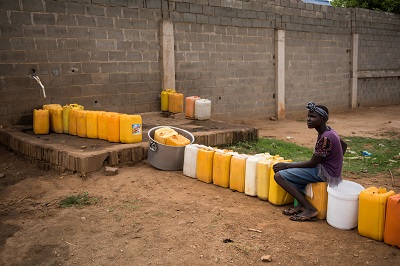27 million people lack safe water in countries facing or at risk of famine
Unsafe water as deadly to severely malnourished children as lack of food
Water shortages, inadequate sanitation, poor hygiene practices and disease outbreaks are posing an additional threat to severely malnourished children in northeast Nigeria, Somalia, South Sudan and Yemen, UNICEF said on Mar 29.

A girl sits at a water tap with a jerry cans lined up in a queue outside a private business on the outskirts of Juba, South Sudan.
Across the four famine-threatened countries, nearly 27 million people are reliant on unsafe water which, for malnourished children, can lead to fatal diarrheal diseases.
“The combination of malnutrition, dirty water and poor sanitation sets off a vicious cycle from which many children never recover,” said Manuel Fontaine, UNICEF Director of Emergency Programmes. “Because unsafe water can cause malnutrition or make it worse, no matter how much food a malnourished child eats, he or she will not get better if the water they are drinking is not safe.”
In northeast Nigeria, 75 per cent of water and sanitation infrastructure in conflict-affected areas has been damaged or destroyed, leaving 3.8 million people with no access to safe water. Displaced families are putting enormous pressure on already strained health and water systems in host communities. One third of the 700 health facilities in the hardest-hit state of Borno have been completely destroyed and a similar number are non-functional.
In Somalia, the number of people needing access to water, sanitation and hygiene in the coming weeks is projected to increase from 3.3 million to 4.5 million – about a third of the population. Many water sources have dried up or are contaminated, toilet facilities are in short supply, and water-borne diseases are rampant. More than 13,000 cases of cholera and acute watery diarrhoea have been reported since the beginning of the year, nearly five times more than in the same period last year. Water prices have risen six-fold in the remotest areas – putting it out of reach of the poorest families.
In South Sudan, 5.1 million people lack safe water, adequate sanitation and hygiene. Half of the water points in the country have been damaged or destroyed. As a result of seasonal dry weather, low water tables are reinforcing competition for water among people and animals, with the result that scarce water sources are being over-used. Lack of adequate sanitation facilities and poor hygiene practices are spreading disease. A cholera outbreak in June 2016 produced more than 5,000 cholera cases and over 100 deaths.
In Yemen, ongoing conflict and mass population displacement have left at least 14.5 million people without adequate drinking water, basic sanitation and hygiene, while causing damage to water infrastructure. An outbreak of cholera and acute watery diarrhoea in October 2016 continues to spread, with over 22,500 suspected cases and 106 deaths. Almost 2 million children are at risk of diarrheal diseases which, even before the conflict, were the second leading cause of death among children under the age of five. The primary health care system in the country is on the verge of collapse, putting the lives of millions of children at risk.
UNICEF’s response, alongside its partners in the four affected countries, includes:
• In northeast Nigeria, providing safe water to nearly 666,000 people and treating nearly 170,000 children suffering from severe acute malnutrition over the last 12 months;
• In Somalia, providing 1.5 million people with access to 7.5 litres of water per day for 90 days, or until the next rains due in April, promoting lifesaving hygiene behaviours, rehabilitating boreholes, establishing new water sources and ensuring appropriate water, sanitation and hygiene services in cholera treatment centres. An oral cholera vaccination campaign – the first of its kind in the country – is also under way to vaccinate half a million people;
• In South Sudan, working with the World Food Programme to fly in nutrition, health, water and sanitation services to children in remote areas; and accelerating hygiene promotion and water safety measures in epidemic prone locations;
• In Yemen, working with partners to keep health facilities functional for the prevention and treatment of malnutrition among the most vulnerable children, and supporting water and sanitation services for 4.5 million people, many of them are displaced.
“We are working around the clock to save as many lives as we can as fast as we can,” said Fontaine. “But without an end to the conflicts plaguing these countries, without sustainable and unimpeded access to the children in need of support and without more resources, even our best efforts will not be enough.”
Source:United Nations Children's Fund
- 256 reads
Human Rights
Ringing FOWPAL’s Peace Bell for the World:Nobel Peace Prize Laureates’ Visions and Actions

Protecting the World’s Cultural Diversity for a Sustainable Future

The Peace Bell Resonates at the 27th Eurasian Economic Summit

Declaration of World Day of the Power of Hope Endorsed by People in 158 Nations

Puppet Show I International Friendship Day 2020

